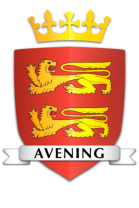

© Avening Parish Council 2023
“Preserve, Conserve, Enhance”
18 Albert Ayres
Sergeant: 7th Battalion Gloster Regiment Albert was born Albert Charles Edward Ayres on Monday the 25th of November 1889 and was baptised in Holy Cross Church four months later on Sunday the 9th of March 1890. His mother Elizabeth (born at Frampton Mansell in 1867) was described in the baptism entry of our Parish Register as a "Single Woman". However, in 1893 she married Charles Robbins with whom she had a further four children. Anecdotal evidence suggests that Albert's childhood was not a particularly happy one and this may have encouraged him to join the army at an early age. His military records did not survive storage in WW2 but we can judge from his service number that he joined the Gloucestershire Regiment in 1909. By the outbreak of war in 1914 he was an experienced soldier and a valuable asset in the training of the early volunteers of Kitchener's New Army. It may well have been this value that kept him in this country for the early part of the war and we next learn of him during February 1917 by which time he had been promoted to Sergeant and was serving with the 7th Battalion in Mesopotamia (now Iraq). We have already learnt of the disaster to our forces in that country with the defeat at Ctesiphon, the withdrawal to Kut-el-Amara in 1916 and the subsequent siege of nearly 12,000 British and Indian troops in that fortified town. Some 23,000 lives were lost in trying to relieve those troops (including Albert's half brother Jesse Robbins - see Roll of Honour No. 13) but all to no avail and the siege ended in April 1916 with the surrender of the survivors, many of whom died as prisoners during a subsequent march across the deserts. By the middle of 1916, our British and Allied forces had a new commander and he began to reorganise and resupply that army in preparation of a new offensive against the Turks. In January 1917 the attack was launched, first at Khadairi Bend, a heavily fortified town north of Kut, which fell on the 29th of January and the 150,000 strong force, including the Gloucester men, then continued its attacks on Kut-el-Amara (known as the Second Battle of Kut) which began on the 17th of February. The town was abandoned by the Turks on the 24th and the chase was on for their retreating forces. The 7th Battalion of the Glosters had crossed the Tigris on the 24th and the following day, moved against enemy positions, coming into action about midday and by evening, had taken a heavily fortified hill, capturing over 300 prisoners. They held that hill despite counter attacks and marched on to a further position the following day. Sunday the 25th was not without cost however, the battalion sustaining over 100 casualties with "some men missing". Albert was one of those missing men. He has no known grave but is commemorated on the Basra Memorial. He was awarded both the Victory Medal and the British Medal, both of which would have been presented to his mother. He was unmarried. We have been unable to locate any relatives.
AveningArchive
WW1 Heroes





© Avening Parish Council 2023
AveningArchive
18 Albert Ayres
Sergeant: 7th Battalion Gloster Regiment Albert was born Albert Charles Edward Ayres on Monday the 25th of November 1889 and was baptised in Holy Cross Church four months later on Sunday the 9th of March 1890. His mother Elizabeth (born at Frampton Mansell in 1867) was described in the baptism entry of our Parish Register as a "Single Woman". However, in 1893 she married Charles Robbins with whom she had a further four children. Anecdotal evidence suggests that Albert's childhood was not a particularly happy one and this may have encouraged him to join the army at an early age. His military records did not survive storage in WW2 but we can judge from his service number that he joined the Gloucestershire Regiment in 1909. By the outbreak of war in 1914 he was an experienced soldier and a valuable asset in the training of the early volunteers of Kitchener's New Army. It may well have been this value that kept him in this country for the early part of the war and we next learn of him during February 1917 by which time he had been promoted to Sergeant and was serving with the 7th Battalion in Mesopotamia (now Iraq). We have already learnt of the disaster to our forces in that country with the defeat at Ctesiphon, the withdrawal to Kut-el-Amara in 1916 and the subsequent siege of nearly 12,000 British and Indian troops in that fortified town. Some 23,000 lives were lost in trying to relieve those troops (including Albert's half brother Jesse Robbins - see Roll of Honour No. 13) but all to no avail and the siege ended in April 1916 with the surrender of the survivors, many of whom died as prisoners during a subsequent march across the deserts. By the middle of 1916, our British and Allied forces had a new commander and he began to reorganise and resupply that army in preparation of a new offensive against the Turks. In January 1917 the attack was launched, first at Khadairi Bend, a heavily fortified town north of Kut, which fell on the 29th of January and the 150,000 strong force, including the Gloucester men, then continued its attacks on Kut-el-Amara (known as the Second Battle of Kut) which began on the 17th of February. The town was abandoned by the Turks on the 24th and the chase was on for their retreating forces. The 7th Battalion of the Glosters had crossed the Tigris on the 24th and the following day, moved against enemy positions, coming into action about midday and by evening, had taken a heavily fortified hill, capturing over 300 prisoners. They held that hill despite counter attacks and marched on to a further position the following day. Sunday the 25th was not without cost however, the battalion sustaining over 100 casualties with "some men missing". Albert was one of those missing men. He has no known grave but is commemorated on the Basra Memorial. He was awarded both the Victory Medal and the British Medal, both of which would have been presented to his mother. He was unmarried. We have been unable to locate any relatives.WW1 Heroes



























